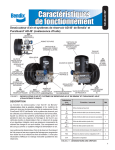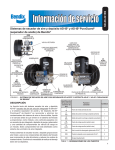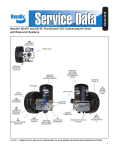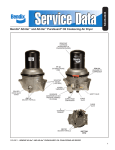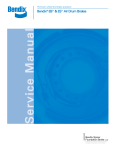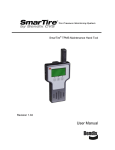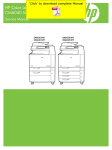Download BENDIX BW2676 User's Manual
Transcript
External Vehicle Walkaround Air Brake System Inspection Please refer to BW1971 (Advanced Troubleshooting Guide for Air Brake Compressors) for Troubleshooting Information Date: Invoice Number: Customer Name: Completed By: Brake System Component Compressor Check For: Broken, Cracked, or Loose Mounting Flange Oil Leaks OK Requires Repair or Adjustment Needs Further Diagnosis Quoted Symptom Notes/Clarification/Impact Replace Exterior leaks at the gaskets. (See Symptom 2.0) Discoloration Compressor Head Discoloration or Rust (See Symptom 4.0 items e, f, g & h) Condition of Inlet Line. Engine Air Filter. A broken, bent, kinked, or restricted Inlet Line, or a poorly maintained inlet air filter or engine air filter. (See Symptom 9.0 items f & g) Condition of Discharge Line Bent, Kinked, Porous or Restricted Discharge Line. (See Symptom 9.0 items f & g) Broken or Loose Mounting Components Exhaust Port Location Replace Exterior leaks at the gaskets are a sign of loose or broken parts. Excessive oil at the head gasket can indicate over pressurized condition. Discoloration or rust can be an indication that the compressor is running hot. High operating temperatures will cause excessive oil carry over and will shorten the life of the compressor. A restricted inlet will cause slow pressure build and oil to pass into the air system. An inlet open to atmosphere and/or a poorly maintained engine air filter will allow dirt to enter the compressor. Compressor life will be significantly reduced as a result. A restricted discharge line will cause slow pressure build and the compressor to run hot. Compressor life will be significantly reduced and could cause engine damage. Governor The governor should be mounted so the exhaust port is pointing down. Some governors are mounted at the air dryer. They require a special mounting gasket and are normally set to cut out at 130 PSI. If the governor’s exhaust port can’t be mounted pointing down, an exhaust check valve may be installed to stop contamination from entering the port. Contamination will reduce the life of the governor. Air Dryer Broken or Loose Mounting Components The Air Dryer is Bypassed Replace If the air dryer has been bypassed, make the necessary repairs and drain all reservoirs. Heater and Wire Condition Replace broken wires. Make sure the plug is seated properly. Excessive Oil at Exhaust Port Though some oil and water is normal at the exhaust port, excessive oil and water are an indication of poor air dryer/ compressor maintenance. (See Symptom 3.0) Broken or Loose Mounting Components Proper Drain Cock Operation Replace When the air dryer is bypassed, moisture enters the air system and freezes. Moisture washes lubrication off of valves and creates rust. Contamination in the air system can cause brake failure. 12v DC or 24v DC should be at the plug when the vehicles ignition is turned on. An inoperable heater will cause air dryer freeze up in cold weather. Poor maintenance will cause premature valve failure and possible system freeze up in colder temperatures. Never pour liquids such as alcohol into the air brake system. Reservoirs Drain Reservoirs Contamination in Reservoirs Air leaking with the drain cock in the closed position. Air won’t drain when the drain cocks are open. FMVSS 121 requires drain cocks function properly so that operation of the reservoir’s single check valves can be validated. Leakage reduces compressor life. Though some oil and water is normal in reservoirs, excessive amounts are not. In order to determine what is excessive it will be necessary to run an the Basic Oil Passing test. The test requires the vehicle to be retested at a later date. (See Symptom 4.0) Excessive oil and water in the reservoirs takes up capacity which causes the compressor to run longer and hotter leading to compressor failure. Contamination can exit the reservoirs and make it into the braking system. Contamination causes early valve failure and could cause loss of brakes. BW2676 © 2011 Bendix Commercial Vehicle Systems LLC, a member of the Knorr-Bremse Group. All Rights Reserved. Visit www.bendix.com for additional information or talk to your Bendix Account Manager. Printed on recycled paper Glad Hands/Hoses Broken / Cracked / Worn Condition Contamination Seals Valves/Air Lines Broken or Loose Mounting Components Excessive Oil at Exhaust Port Replace Clear contamination from glad hand. Make sure dummy glad hands are used when glad hands are not connected. Worn or cracked glad hand seals should be replaced. Replace Broken or Loose Fittings Though some oil and water is normal at the exhaust port, excessive oil and water are an indication of poor air dryer/compressor maintenance. It will be necessary to run an oil passing test such as the Bendix® BASIC™ test. The test requires that the vehicle be re-tested at a later date. (See Symptom 4.0) Replace Air Line Condition Worn or cut air lines must always be replaced. Brake Chambers Broken or Loose Mounting Components Size Push Rod Rubbing on Housing Bent Push Rod Slack Adjusters Broken or Loose Mounting Components Size Type A worn locking tab could cause the glad hand to come loose during operation. Contamination in the glad hand has a direct path to the trailer relay valve. Contamination can cause loss of brakes on the trailer as well as the potential that the brakes won’t release and will drag. Never pour liquids such as alcohol down glad hand lines. Leaking glad hand seals can cause the compressor to run excessively, resulting in a reduction of its service life. Poor maintenance will cause premature valve failure and possible freeze up. A loss of system brakes or slow brake release are possible. Use DOT air brake fittings. Never use regular pipe fittings. Replacing fittings with non-genuine fittings (other than those for specified by the vehicle manufacturer) can cause brake imbalance. Always use the same size and type. Replacing air lines with nongenuine lines (lines other than those for specified by the vehicle manufacturer) can cause brake imbalance. Replace The brake chamber size should match across an axle. Incorrect brake chamber size can cause unstable braking. Normally, if one brake chamber fails, the opposite brake on the same axle will fail shortly thereafter. Push rods rubbing on the housing are an indication that Rubbing push rods can weaken and fail, or bind and bend, causing the rod is not cut to the proper size. Another cause dragging brakes or brake failure on that wheel end. could be that the brake chamber is not aligned with the slack adjuster. Bent push rods are an indication that a) the brake Bent push rods or in-operable slack adjusters will cause brake chamber push rod is not cut to size properly; or b) that dragging or brake failure on the impacted wheel end. the slack adjuster is not functioning properly. Replace Slack adjusters must be the same size across an axle. Slacks are measured from the center of the yoke to the center of the S-Cam. Slack adjusters must be the identical model and manufacturer across an axle. Stroke Check the operating stoke per the manufacturers instructions. (North American Standard Vehicle Out of Service Criteria) Ensure the Lining is in Place Visually check the foundation brake, looking for broken parts and missing lining block. Incorrect slack adjuster size can drastically change brake torque on the affected wheel end. Incorrect slack adjuster size can cause the vehicle to be put in an out of service condition upon inspection. Some slack adjusters function on each brake application, while others adjust on each brake application. Never mix manufacturers across an axle. Improper stroke adjustment can cause brake failure on the impacted wheel end. Improper stroke adjustment can cause the vehicle to be put in an out of service condition upon inspection. Brake Lining Cracked, loose or missing Lining Worn to Wear Indicator Leaking Wheel Seals Drums and Rotors Visually Check for Cracks Broken parts and missing lining block may cause brake failure on the affected wheel end. Broken parts and missing lining block can cause the vehicle to be put in an out of service condition during inspection. Visually check for cracks or voids on the edge of the Cracked or missing lining block may cause brake failure on the lining. Check for segments that are missing and the rivet affected wheel end. Cracked or missing lining block may cause or bolt is exposed. (See North American Standard the vehicle to be put out of service. Vehicle Out of Service Criteria) Most lining blocks are manufactured with a wear Excessive worn brake lining may cause brake failure. Excessive indicator. If the wear indicator is not present, use the worn linings can cause the vehicle to be put in an out of service ® Bendix Brake Lining Wear Gauge BW7261 condition upon inspection. If the leaking wheel seal has allowed oil to leak onto the Oil soaked block will reduce brake torque, causing brake lining block, the block should be replaced on both axle ends. imbalance. Replace Do not turn brake drums.



